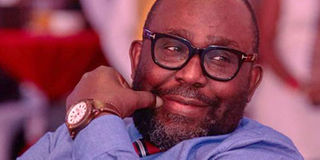Don’t whine about ‘scientific’ elections. Here’s how to win

Author, Mr Charles Onyango-Obbo. PHOTO/FILE.
What you need to know:
- To do that, you need to establish something our politicians don’t have – a granular electronic database of your constituents (as a law-abiding citizen, I will not say here the grey-area technical tricks you can play to reduce being conned by your constituents once you have that database).
- It would have their birthdays, their children’s birthdays, their favourite Premier League football team et al. For those without phones, for the price of a few glasses of kafirifiri you can get them a basic dirt-cheap feature phone. Get out of the voters’ armpits. Stand on a hill in 2021.
There are many people who are angry at Uganda’s forthcoming 2021 so-called “scientific” election, where direct in-person contact between candidates and voters has been severely restricted, and aspirants are being urged to use media and digital platforms instead because of the risks of spreading Covid-19.
For president, these restrictions are seen as little more than an election mugging by President Yoweri Museveni. And for the rest, the argument is that they favour incumbents, which is why, in a rare show of bipartisan consensus, both NRM and Opposition aspirants agree that it is bad.
Yes, the restrictions make things harder for the Opposition and NRM challengers, but not impossible. To get a sense of the possibilities, aspiring candidates might want to look to the example of one of our own, Zohran Kwame Mamdani. Zohran is the son of Prof Mahmood Mamdani and filmmaker Mira Nair.
Last month, he stood in US Democratic Party primary elections to represent New York’s 36th Assembly District, western Queens. Zohran, 29, emerged winner of the primary comfortably ahead of incumbent Aravella Simotas, 41.
The results were not final, though, because thousands of absentee ballots that were mailed out to voters in the primary were yet to return. When they all get back and are counted, the victor will be known. We might have said who is likely to triumph, but I guess this is not the place for that.
Before we got to the heart of our example, it is necessary to explain how come Zohran, a Ugandan, is standing for office in New York, and not for LC2 in Buziga. Zohran, thanks in part to his very nomadic parents, is a triple, nay, quadruple heritage child.
He is a Ugandan-Indian-South African-American. On his election page, he describes himself simply as an Indian-Ugandan New Yorker. Actually, Simotas too is a triple heritage child, born in Rhodesia (now Zimbabwe) two years before independence, moved with her family as a toddler to Greece, then to the US.
In that sense, the election represents the new America, the shape of a future rebirth, but also the changing face of the country that both frightens the diehard conservative base of President Donald Trump, and continues to generously supply him support no matter how atrociously he acts.
Anyway, as an incumbent, Simotas had name recognition and the old politics campaign infrastructure. Her campaign had knocked on thousands of doors and shaken even more hands, before Covid-19 shook things and ended all that.
Zohran, running on a very progressive ticket, and backed by the Democratic Socialists of America (DSA), an organisation of democratic socialist, social democratic and labour-oriented folks in the US, was only getting started, mostly on foot, campaigning with his people in train stations, bus stops, and the poorer parts of his constituency. Photos show him helping elderly women cross the street.
He is a housing counsellor in New York, running on a fair housing platform, and is not accepting money from rich people, and definitely not a penny from the housing industry. Just small, small contributions from wananchi. Many of his campaign materials are handwritten, not fancily printed.
Those worried about the rigging possibilities of scientific elections might want to visit his website, “Zohran for Assembly” to get tips on how a newcomer might respond, when Covid-19 brings traditional politicking to a screeching stop.
The situation in America is, of course, different so it might not be possible to double down on phone and digital outreach to the level that Zohran’s campaign did, but a version of it is still possible. His most brilliant stroke, when Covid-19 struck, was to convert their campaign office into a centre to help constituents who had been affected.
His website reports that the Ramadan meal delivery programme served more than 14,000 hot Iftar meals. They created a weekly grocery distribution programme, which also supplied more than 1,000 bags of groceries to families in need.
So, in some ways, the supposed Covid-19 elections offer opportunities to be creative and campaign suitably for a 21st Century election, not like we are in the 1960s.
This is an opportunity to exploit the boda boda distribution network differently. Instead of people coming to your rally to collect soap, salt, sugar and t-shirt goodies, get boda bodas to deliver it to their homes.
To do that, you need to establish something our politicians don’t have – a granular electronic database of your constituents (as a law-abiding citizen, I will not say here the grey-area technical tricks you can play to reduce being conned by your constituents once you have that database).
It would have their birthdays, their children’s birthdays, their favourite Premier League football team et al. For those without phones, for the price of a few glasses of kafirifiri you can get them a basic dirt-cheap feature phone. Get out of the voters’ armpits. Stand on a hill in 2021.
Mr Onyango-Obbo is a journalist,
writer and curator of the “Wall of Great Africans”. Twitter@cobbo3




